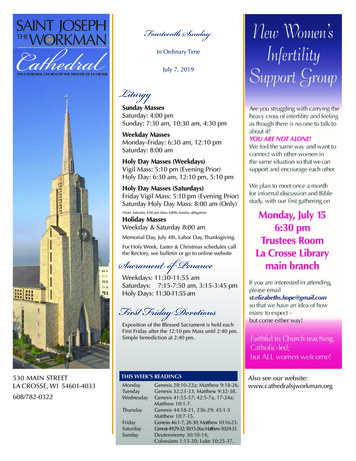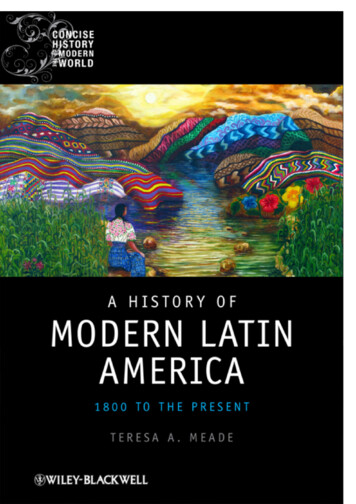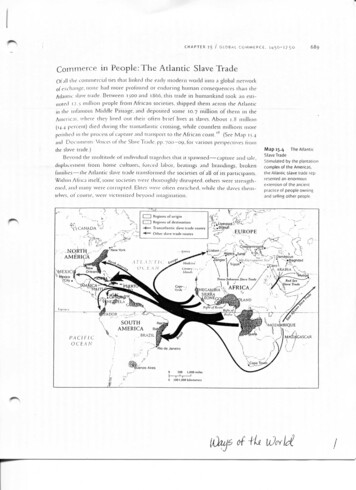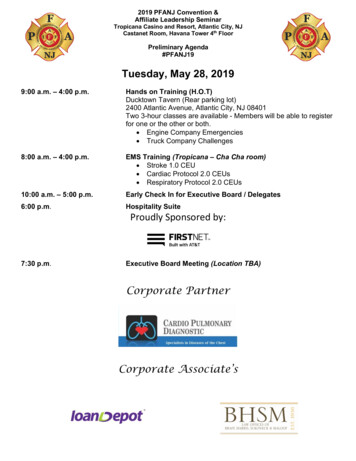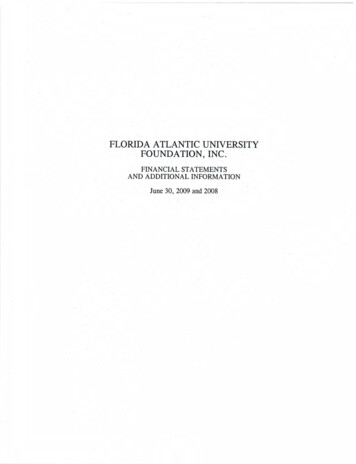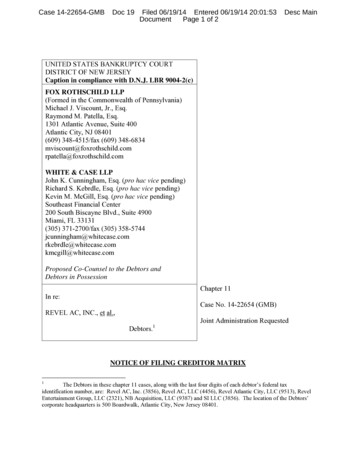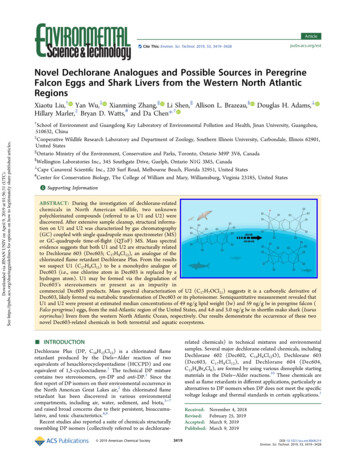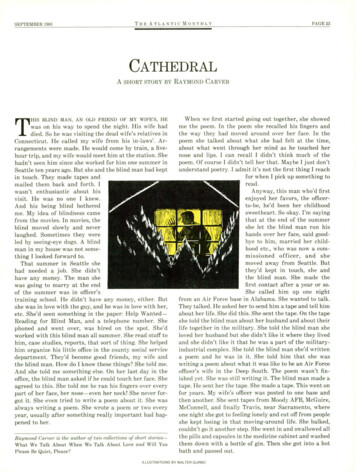
Transcription
SEPTEMBER 1981T he A tlanti c M onthlyPAGE 23CathedralA SHORT STORY BY RAYMOND CARVERhis blind man, an old friend of my wife ’s, hewas on his way to spend the night. His wife haddied. So he was visiting the dead wife’s relatives inConnecticut. He called my wife from his in-laws’. Ar rangements were made. He would come by train, a fivehour trip, and my wife would meet him at the station. Shehadn’t seen him since she worked for him one summer inSeattle ten years ago. But she and the blind man had keptin touch. They made tapes andmailed them back and forth. Iwasn’t enthusiastic about hisvisit. He was no one I knew.And his being blind botheredme. My idea of blindness camefrom the movies. In movies, theblind moved slowly and neverlaughed. Sometimes they wereled by seeing-eye dogs. A blindman in my house was not some thing I looked forward to.That summer in Seattle shehad needed a job. She didn’thave any money. The man shewas going to marry at the endof the summer was in officer’straining school. He didn’t have any money, either. Butshe was in love with the guy, and he was in love with her,etc. She’d seen something in the paper: Help Wanted—Reading for Blind Man, and a telephone number. Shephoned and went over, was hired on the spot. She’dworked with this blind man all summer. She read stuff tohim, case studies, reports, that sort of thing. She helpedhim organize his little office in the county social servicedepartment. They’d become good friends, my wife andthe blind man. How do I know these things? She told me.And she told me something else. On her last day in theoffice, the blind man asked if he could touch her face. Sheagreed to this. She told me he ran his fingers over everypart of her face, her nose—even her neck! She never for got it. She even tried to write a poem about it. She wasalways writing a poem. She wrote a poem or two everyyear, usually after something really important had hap pened to her.TRay mond Carver is the author of two collections o f short stories—What We Talk About When We Talk About Love and Will YouPlease Be Quiet, Please?When we first started going out together, she showedme the poem. In the poem she recalled his fingers andthe way they had moved around over her face. In thepoem she talked about what she had felt at the time,about what went through her mind as he touched hernose and lips. I can recall I didn’t think much of thepoem. Of course I didn’t tell her that. Maybe I just don’tunderstand poetry. I admit it’s not the first thing I reachfor when I pick up something toread.Anyway, this man who’d firstenjoyed her favors, the officerto-be, he’d been her childhoodsweetheart. So okay. I’m sayingthat at the end of the summershe let the blind man run hishands over her face, said good bye to him, married her child hood etc., who was now a com missioned officer, and shemoved away from Seattle. Butthey’d kept in touch, she andthe blind man. She made thefirst contact after a year or so.She called him up one nightfrom an Air Force base in Alabama. She wanted to talk.They talked. He asked her to send him a tape and tell himabout her life. She did this. She sent the tape. On the tapeshe told the blind man about her husband and about theirlife together in the military. She told the blind man sheloved her husband but she didn’t like it where they livedand she didn’t like it that he was a part of the militaryindustrial complex. She told the blind man she’d writtena poem and he was in it. She told him that she waswriting a poem about what it was like to be an Air Forceofficer’s wife in the Deep South. The poem wasn’t fin ished yet. She was still writing it. The blind man made atape. He sent her the tape. She made a tape. This went onfor years. My wife’s officer was posted to one base andthen another. She sent tapes from Moody AFB, McGuire,McConnell, and finally Travis, near Sacramento, whereone night she got to feeling lonely and cut off from peopleshe kept losing in that moving-around life. She balked,couldn’t go it another step. She went in and swallowed allthe pills and capsules in the medicine cabinet and washedthem down with a bottle of gin. Then she got into a hotbath and passed out.ILLUSTRATIONS BY WALTER GURBO
PAGE 24T he A t l a n t i c M o n t h l yB ut instead of dying she got sick. She threw up. H erofficer—W hy should he have a nam e? He was the child hood sw eetheart, and w h at m ore does he w ant?—camehome from a tra in in g m ission, found her, and called theam bulance. In tim e, she pu t it on th e tape and sent thetape to th e blind man. Over the years she p u t all kinds ofstuff on tap es and sen t the tapes off lickety-split. N ext tow ritin g a poem every year, I think it was h er chief m eansof recreation. On one tap e she told the blind m an she’ddecided to live aw ay from h er officer for a tim e. Onan o th er tap e she told him about her divorce. She and Ibegan going out, and of course she told h er blind m anabout this. She told him everything, or so it seemed tome. Once she asked me if I’d like to hear th e latest tapefrom th e blind man. This was a year ago. I was on thetape, she said. So I said okay, I ’d listen to it. I got usd rinks and we settled down in the living room. We m adeready to listen. F irs t she inserted th e tape into the playerand adjusted a couple of dials. Then she pushed a lever.The tape squeaked and someone began to talk in th is loudvoice. She lowered the volume. A fter a few m inutes ofharm less chitchat, I heard my own nam e rasped out byth is stran g er, th is m an I didn’t even know! And then this:“F rom all you’ve said about him, I can only conclude—”But we were in terru p ted , a knock a t the door, som ething,and we didn’t get back to the tape. Maybe it was ju s t aswell. I’d h eard enough, anyway.Now th is sam e blind stra n g e r w as com ing to sleep inmy house.“Maybe I could take him bowling,” I said to my wife.She was a t th e d rain in g board doing scalloped potatoes.She p u t down th e knife she was using on th e onion andtu rn ed around.“If you love me,” she said, “you can do th is for me. Ifyou don’t love me, okay. But if you had a friend, anyfriend, and th e friend came to visit, I’d make himfeel com fortable.” She wiped her hands w ith the dishtowel.“I don’t have any blind friends,” I said.“You don’t have an y friends,” she said. “Period.Besides,” she said, “goddam m it, his w ife’s ju st died!Don’t you u n d erstand th a t? The m an’s lost his wife!”I didn’t answ er. She’d told me a little about the blindm an’s wife. The wife’s nam e w as Beulah. Beulah! T h a t’s anam e for a colored woman.“W as his wife a N egro?” I asked.“A re you crazy?” my wife said. “H ave you ju st flippedor som ething?” She picked up th e onion. I saw it h it thefloor, then roll under the stove. “W h at’s wrong w ithyou?” she said. “A re you drunk?”“I ’m ju s t asking,” I said.R ight th en my wife filled me in w ith more detailth a n I cared to know. I m ade a drink and s a t a t the kitchentab le to listen. Pieces of the story began to fall intoplace.Beulah had gone to work for the blind m an the sum m erSEPTEMBER 1981a fte r my wife had stopped w orking for him . P re tty soonBeulah and the blind m an had them selves a chu rch w ed ding. I t was a little w edding—W ho’d be anxious to a tte n dsuch a wedding in th e first p lace?—ju s t th e tw o of th em ,and the m in ister and the m in iste r’s wife. B ut it w as achurch wedding ju s t th e sam e. W h a t B eulah h ad w an ted ,h e ’d said. B ut even th en B eulah m u st have been c a rry in gcancer in h er lym ph glands. A fte r they h ad been in s e p a r able for eight y e a rs —my w ife’s word, “in se p a ra b le ” —B eulah’s h ealth w ent into a ra p id decline. She died in aS eattle hospital room, the blind m an sittin g beside th ebed and holding on to her hand. T hey’d m arrie d , livedand worked together, slept to g e th e r—had sex, s u re —andthen th e blind m an buried her. All th is w ith o u t h is h av ing ever seen w h a t th e goddam ned w om an looked like. I twas beyond my understanding. H e arin g th is, I fe lt so rryfor the blind m an for a m inute. And th en I found m yselfthin k in g w hat a p itifu l life th is w om an m u st have led.Im agine a wom an who could never see h e rse lf reflected inth e eyes of her loved one. A w om an who could go on daya fte r day and never receive th e sm allest com plim entfrom h er beloved. A w om an whose husb an d would neverread the expression on h er face, be it m isery or som e th in g b etter. Someone who could w ear m akeup or n o t—w h a t difference to him ? She could, if she w an ted , w eargreen eye shadow around one eye, a s tra ig h t pin in h ern ostril, yellow slacks and burgundy pum ps, no m a tte r.And then to slip off into death, th e blind m a n ’s h an d onh er hand, his blind eyes strea m in g te a r s —I ’m im ag in in gnow—her la st th o u g h t m aybe this: th a t h e r beloved nev er knew w hat she looked like, and she on an ex p ress toth e grave. R obert w as left w ith a sm all in su ran c e policyand h alf of a tw enty-peso M exican coin. The o th e r h a lf ofthe coin w ent into th e box w ith her. P ath etic.O WHEN THE TIME ROLLED AROUND, MY WIFE WENTSto the rail statio n . W ith noth in g to do b u t w a it—and sure, I blam ed him fo r t h a t —I w as h av in g adrink and w atching TV w hen I h eard th e ca r pull in to th edrive. I got up from th e sofa w ith my d rin k and w en t tothe window to have a look.I saw my wife laughing as she parked th e car. I saw h erget out of the ca r and sh u t th e door. She w as still w earin ga smile. J u s t am azing. She w ent around to th e o th e r sideof th e car to w here th e blind m an w as alre ad y s ta rtin g toget out. This blind m an, fe a tu re this, he w as w e arin g afull beard! A beard on a blind m an! Too m uch, I say. Theblind m an reached into the back se a t and d rag g ed o u t asuitcase. My wife took his arm , sh u t th e ca r door, and,talking all the way, moved him down th e driv e and th e nup the steps to th e fro n t porch. I tu rn e d off th e TV. Ifinished m y drink, rinsed th e glass, dried m y h an d s. T henI w ent to th e door.My wife said, “I w a n t you to m eet R obert. R obert, th isis m y husband. I’ve told you all ab o u t him .” She closed
SEPTEMBER 1981T he A t l ant i c M onthlythe porch screen. She was beaming. She had this blindman by his coat sleeve.The blind man let go of his suitcase and up came hishand.I took it. He squeezed hard, held my hand, and then helet it go.“I feel like we’ve already met,” he boomed.“Likewise,” I said. I didn’t know what else to say. ThenI said, “Welcome. I’ve heard a lot about you.” We beganto move then, a little group, from the porch into theliving room, my wife guiding him by the arm. He carriedhis suitcase in his other hand. My wife said things like,“To your left here, Robert. That’s right. Now watch it,there’s a chair. That’s it. Sit down right here. This is thesofa. We just bought this sofa two weeks ago.”I started to say something about the old sofa. I’d likedthat old sofa. But I didn’t say anything. Then I wanted tosay something else, small talk, about the scenic HudsonRiver. How going to New York, sit on the right-hand sideof the train, and coming from New York, the left-handside.K neeling D own to L ookI nto a CulvertI kneel down to peer into a culvert.The other end seems far away.One cone of light floats in the shadowed water.This is how our children will look when we are dead.I kneel near floating shadowy water,watching water flowing in a tunnelblue sky widens the other en d darkened by the shadowy insides of the steel.Are they all born? I walk on farther;out in the plowing I see a lake newly made.I have seen it before . . . it is a lakeI return to when all my family, grown, are gone.I have fathered so many children and returnedto that lake—grayish flat slate banks,low arctic bushes. I am a lake-serpent, throwing water dropsoff my head. Behind me my arching body follows.How long I stay there alone! For a thousand yearsI am alone, with no duties, living as I live.Then one morning a feathery head pokes from the water.I fight—it’s time—it’s right—and am torn to pieces fighting.—Robert BlyPAGE 25“Did you have a good train ride?” I said. “Which side ofthe train did you sit on, by the way?”“What a question, which side!” my wife said. “What’sit matter which side?” she said.“I just asked,” I said.“Right side,” the blind man said. “For the sun. Untilthis morning,” the blind man said, “I hadn’t been on atrain in nearly forty years. Not since I was a kid. Withmy folks. That’s been a long time. I’d nearly forgottenthat sensation. I have winter in my beard now,” he said.“So I’ve been told, anyway. Do I look distinguished, mydear?” he said to my wife.“You look distinguished, Robert,” she said. “Robert,”she said. “Robert, it’s just so good to see you.” My wifefinally took her eyes off the blind man and looked atme.I had the distinct feeling she didn’t like what she saw. Ishrugged.I’ve never met or personally known anyone who wasblind. This blind man was late forties, a heavyset, bald ing man with stooped shoulders, as if he carried a greatweight there. He wore brown slacks, brown cordovanshoes, a light-brown shirt, a tie, a sports coat. Spiffy. Healso had this full beard. But he didn’t carry a cane and hedidn’t wear dark glasses. I’d always thought dark glasseswere a must for the blind. Fact was, I wished he had apair. At first glance, his eyes looked like anyone else’seyes. But if you looked close there was something differ ent about them. Too much white in the iris, for one thing,and the pupils seemed to move around in the socketswithout his knowing it or being able to control it. Creepy.As I stared at his face, I saw the left pupil turn in towardhis nose, while the other made a futile effort to keepin one place. But it was only an effort, for that eyewas on the roam without his knowing it or wanting itto be.I said, “Let me get you a drink. W hat’s your pleasure?We have a little of everything. It’s one of our pastimes.”“Bub, I’m a scotch man myself,” he said fast enough, inthis big voice.“Right,” I said. Bub! “Sure you are. I knew it.”He let his fingers touch his suitcase, which was sittingalongside the sofa. He was taking his bearings. I didn’tblame him for that.“I’ll move that up to your room,” my wife said.“No, th a t’s fine,” he said loudly. “It can go up when I goup.”“A little water with the scotch?” I said.“Very little,” he said.“I knew it,” I said.He said, “Just a tad. The Irish actor, Barry Fitzgerald?I’m like that fellow. When I drink water, Fitzgerald said,I drink water. When I drink whiskey, I drink whiskey.”My wife laughed. The blind man brought his hand upunder his beard. He lifted his beard slowly and let itdrop.
PAGE 26IT he A t l a n t i c M o n t h l yDID THE DRINKS, THREE BIG GLASSES OF SCOTCHwith a splash of water in each. Then we made our selves comfortable and talked about Robert’s travels.First the long flight from the West Coast to Connecticut,we covered that. Then from Connecticut up here by train.We had another drink concerning that leg of the trip.I remembered having read somewhere that the blinddidn’t smoke because, speculation had it, they couldn’tsee the smoke they exhaled. I thought I knew that muchand that much only about blind people. But this blindman smoked his cigarette down to the nubbin and then litanother one. This blind man filled his ashtray and mywife emptied it.When we sat down to the table for dinner we hadanother drink. My wife heaped Robert’s plate with cubesteak, scalloped potatoes, green beans. I buttered him uptwo slices of bread. I said, “Here’s bread and butter foryou.” I swallowed some of mydrink. “Now let us pray,” I said,and the blind man lowered hishead. My wife looked at me, hermouth agape. “Pray the phonewon’t ring and the food doesn’tget cold,” I said.We dug in. We ate everythingthere was to eat on the table.We ate like there was no tomor row. We didn’t talk. We ate. Wescarfed. We grazed that table.We were into serious eating.The blind man had right awaylocated his foods, he knew justwhere everything was on hisplate. I watched with admira tion as he used his knife and fork on the meat. He’d cuttwo pieces of meat, fork the meat into his mouth, andthen go all out for the scalloped potatoes, the beans next,and then he’d tear off a hunk of buttered bread and eatthat. He’d follow this up with a big drink of milk. Itdidn’t seem to bother him to use his fingers once in awhile, either. He used his bread to scoop beans.We finished everything, including half of a strawberrypie. For a few moments we sat as if stunned. Sweatbeaded on our faces. Finally, we got up from the table andleft the dirty plates. We didn’t look back. We took our selves into the living room and sank into our placesagain. Robert and my wife sat on the sofa. I took the bigchair. We had us two or three more drinks while theytalked about the major things that had transpired forthem in the past ten years. For the most part, I justlistened. Now and then I joined in. I didn’t want him tothink I’d left the room, and I didn’t want her to think Iwas feeling left out. They talked of things that had hap pened to them—to them!—these past ten years. I waitedin vain to hear my name on my wife’s sweet lips: “Andthen my dear husband came into my life”—somethingSEPTEMBER 1981like that. But I heard nothing of the sort. More talk ofRobert. Robert had done a little of everything, it seemed,a regular blind jaek-of-all-trades. But most recently heand his wife had had an Amway distributorship, fromwhich, I gathered, they’d earned their living, such as itwas. The blind man was also a ham radio operator. Hetalked in his loud voice about conversations he’d had withfellow operators in Guam, the Philippines, Alaska, evenTahiti. He said he’d have a lot of friends there if he everwanted to go visit those places. From time to time he’dturn his blind face toward me, put his hand under hisbeard, ask me something. How long had I been at mypresent position? (Three years.) Did I like my work? (Ididn’t.) Was I going to stay with it? (What were theoptions?)Finally, when I thought he was beginning to run down,I got up and turned on the TV.My wife looked at me withirritation. She was heading to ward a boil. Then she looked atthe blind man and said, “Ro bert, do you have a TV?”The blind man said, “Mydear, I have two TVs. I have acolor set and a black-and-whitething, an old relic. It’s funny,but if I turn the TV on, and I’malways turning it on, I turn thecolor set on. Always. It’s fun ny.”I didn’t know what to say tothat. I had absolutely nothingto say about that. No opinion.So I watched the news programand tried to listen to what the announcer was saying.“This is a color TV,” the blind man said. “Don’t ask mehow, but I can tell.”“We traded up a while ago,” I said.The blind man had another taste of his drink. He liftedhis beard, sniffed it, and let it fall. He leaned forward onthe sofa. He positioned his ashtray on the coffee table,then put the lighter to his cigarette. He leaned back onthe sofa and crossed his legs at the ankles.My wife covered her mouth, and then she yawned. Shestretched. She said, “I think I’ll go upstairs and put onmy robe. I think I’ll change into something else. Robert,you make yourself comfortable,” she said.“I’m comfortable,” the blind man said.“I want you to feel comfortable in this house,” shesaid.“I am comfortable,” the blind man said.After she’d left the room, he and I listened to theweather report and then to the sports roundup. My wifehad been gone so long I didn’t know if she was going tocome back. I thought she might have gone to bed. Iwished she’d come back downstairs. I didn’t want to be
SEPTEMBER 1981T he A tlanti c M onthlyleft alone with a blind man. I asked him if he wantedanother drink, and he said sure. Then I asked if hewanted to smoke dope with me. I said I’d just rolled anumber. I hadn’t, but I planned to do so in about twoshakes.“I’ll try some with you,” he said.“Damn right,” I said. “That’s the stuff.”I got our drinks and sat down on the sofa with him.Then I rolled us two fat numbers. I lit one and passed it. Ibrought it to his fingers. He took it and inhaled.“Hold it as long as you can,” I said. I could tell he didn’tknow the first thing.My wife came back downstairs wearing her robe andpink slippers. “What do I smell?” she said.“We thought we’d have us some cannabis,” I said.My wife gave me a purely savage look. Then she lookedat him and said, “Robert, I didn’t know you smoked.”He said, “I do now, my dear. First time for everything,”he said. “But I don’t feel anything yet.”“This stuff is pretty mellow,” I said. “This stuff is mild.It’s dope you can reason with. It doesn’t mess you up.”“Not much it doesn’t, bub,” he said, and laughed.My wife sat on the sofa between the blind man and me.I passed her the number. She took it and inhaled andthen passed it back to me. “Which way is this going?” shesaid. Then she said, “I shouldn’t be smoking this. I canhardly keep my eyes open as it is. That dinner did me in. Ishouldn’t have eaten so much.”“It was the strawberry pie,” the blind man said.“That’s what did it,” he said, and he laughed his biglaugh. Then he shook his head.“There’s more strawberry pie,” I said.“Do you want some more, Robert?” my wife asked.“Maybe in a little while,” he said.We gave our attention to the TV. My wife yawnedagain. She said, “Your bed is made up when you feel likegoing to bed, Robert. I know you must have had a longday. When you’re ready to go to bed, say so.” She pulledhis arm. “Robert?”He came to and said, “I’ve had a real nice time. Thisbeats tapes, doesn’t it?”I said, “Coming at you,” and I put the number betweenhis fingers. He inhaled, held the smoke, and then let it go.It was like he’d been doing it since he was nine years old.“Thanks, bub,” he said. “But I think this is all for me. Ithink I’m beginning to feel it,” he said. He held the burn ing roach out for my wife.“Same here,” she said. “Ditto. Me too.” She took theroach and passed it to me. “I may just sit here for a whilebetween you two guys with my eyes closed. But don’t letme bother you, okay? Either one of you. If it bothers you,say so. Otherwise, I may just sit here with my eyes closeduntil you’re ready to go to bed,” she said. “Your bed’smade up, Robert, when you’re ready. It’s right next to ourroom at the top of the stairs. We’ll show you up whenyou’re ready. You wake me up now, you guys, if I fallPAGE 27asleep.” She said that and then she closed her eyes andwent to sleep.The news program ended. I got up and turned the chan nel. I sat back down on the sofa. I wished my wife hadn’tpooped out. Her head lay across the back of the sofa, hermouth open. She’d turned so that her robe had slippedaway from her legs, exposing a juicy thigh. I reached todraw her robe over the thigh, and it was then I glanced atthe blind man. What the hell! I flipped the robe openagain.“You say when you want some strawberry pie,” Isaid.“I will,” he said.I said, “Are you tired? Do you want me to take you upto your bed? Are you ready to hit the hay?”“Not yet,” he said. “No, I’ll stay up with you, bub. Ifth a t’s all right. I’ll stay up until you’re ready to turn in.We haven’t had a chance to talk. Know what I mean? Ifeel like me and her monopolized the evening.” He liftedhis beard and he let it fall. He picked up his cigarettesand his lighter.“That’s all right.” I said. Then I said, “I’m glad for thecompany.” And I guess I was. Every night I smoked dopeand stayed up as long as I could before I fell asleep. Mywife and I hardly ever went to bed at the same time.When I did go to sleep, I had these dreams. Sometimes I’dwake up from one of them, the heart going crazy.OMETHING ABOUT THE CHURCH AND THE MIDDLE AGES,Snarrated by an Englishman, was on the TV. Notyour run-of-the-mill TV fare. I wanted to watchsomething else. I turned to the other channels. But therewas nothing on them, either. So I turned back to the firstchannel and apologized.“Bub, it’s all right,” he said. “It’s fine with me. What ever you want to watch is okay. I’m always learningsomething. Learning never ends. It won’t hurt me tolearn something tonight. I got ears,” he said.We didn’t say anything for a time. He was leaningforward with his head turned at me, while his right earwas aimed in the direction of the set. Very disconcerting.Now and then his eyelids drooped and then they snappedopen again. Now and then he put his fingers into hisbeard and tugged, as if thinking about something he washearing on the television.On the screen a group of men wearing cowls was beingset upon and tormented by men dressed in skeleton cos tumes and men dressed as devils. The men dressed asdevils wore devil masks, horns, and long tails. This pag eant was part of a procession. The Englishman said it alltook place in Malaga, Spain, once a year. I tried to explainto the blind man what was happening.“Skeletons,” he said. “I know about skeletons,” he said,and he nodded.The TV showed Chartres Cathedral. Then there was a
PAGE 28T he A t l a n t i c M o n t h l ylong slow look a t Sainte Chapelle. F inally the pictureswitched to N otre Dame, w ith its flying buttresses, itsspires reaching tow ard clouds. The cam era pulled aw ayto show the whole of th e cath ed ral rising above the sky line.T here were tim es when the E nglishm an who was te ll ing th e th in g would shut up, would sim ply let the cam eramove around over the cathedrals. Or else the cam erawould tour th e countryside, m en in fields walking behindoxen. I w aited as long as I could. Then I felt I had to saysom ething. I said, “They’re showing the outside of th iscath ed ral now. Gargoyles. L ittle statu es carved to looklike m onsters. Now I guess th ey ’re in Italy. Yeah, th ey ’rein Italy. T here’s fresco paintings on the w alls of th is onechurch.”“W h at’s fresco painting, bub?” he asked, and he sippedfrom his drink.I reached for my glass. B ut it w as em pty. I tried torem em ber w h at I could rem em ber ab o u t frescoes.“You’re asking me w hat are frescoes?” I said. “T h at’s agood question. I don’t know.”The cam era moved to a cath ed ral outside Lisbon, P o r tugal. The differences in the P ortuguese cathedral com pared w ith th e F rench and Italian were not th a t great.But they were there. Mostly th e in terio r stuff. Thensom ething occurred to me and I said, “Som ething hasoccurred to me. Do you have an idea w h at a cathedral is?W hat they look like, th a t is? Do you follow me? If som e body says cathedral to you, do you have any notion w h atth ey ’re talk in g about? Do you know the differencebetw een th a t and a B aptist church, say? Or th a t and amosque, or synagogue?”He let th e smoke issue from his m outh. “I know theytook hundreds of w orkers fifty or a hundred years tobuild,” he said. “I ju s t heard the m an say th a t, of course.I know generations of th e sam e fam ilies worked on acathedral. I heard him say th a t, too. The m en who beganth e ir life’s work on them , they never lived to see thecom pletion of th e ir work. In th a t wise, bub, they’re nodifferent from th e re st of us, rig h t? ” He laughed. Thenhis eyelids drooped again. H is head nodded. H e seemed tobe snoozing. Maybe he w as im agining him self in P o rtu gal. The TV was showing an o th er ca th ed ral now. Thisone was in G erm any. The E nglishm an’s voice droned on.“C athedrals,” th e blind m an said. He sa t up and rolledhis head back and forth. “If you w a n t th e tru th , bub,t h a t’s about all I know. W hat I ju s t said. W hat I heardhim say. But m aybe you could describe one to me? I wishyou’d do it. I ’d like th a t. If you w an t to know, I reallydon’t have a good idea.”I stared h ard a t the shot of th e ca th ed ral on the TV. Itheld a m inute. Then it was gone, and the view was of theinside w ith rows of benches and high windows. Howcould I even begin to describe it? B ut say my lifedepended on it. Say my life was being th reaten ed by aninsane T urkish bey.SEPTEMBER 1981They took the cam era outside again. I s ta re d somem ore a t the ca th ed ral before th e picture flipped off intothe countryside. T here w as no use. I tu rn e d to th e blindm an and said, “To begin w ith, th e y ’re very tall. Very,very ta ll.” I was looking around th e room for clues. I triedagain. “They reach way up. Up and up. T ow ard th e sky.They soar. They’re like poetry, t h a t ’s w h a t th e y ’re like.They’re so big, some of them , th ey have to have th esesupports. To help hold them up, so to speak. T hese su p ports are called bu ttresses. They rem ind me of viaductsfor some reason. B ut m aybe you don’t know viaducts,either? Som etim es th e ca th e d rals have devils and suchcarved into the fro n t. Som etim es g re a t lords and ladies.Don’t ask me w hy th is is,” I said. He w as nodding. Thewhole upper p a rt of his body seem ed to be m oving backand fo rth . “I’m not doing so good, am I? ” I said.H e stopped nodding and leaned forw ard on th e edge ofthe sofa. As he listened to me, he w as ru n n in g h is fingersthrough his beard. I w a sn ’t g ettin g th ro u g h to himthough, I could see th a t. B ut he w aited fo r m e to go onju s t th e same. He nodded, as if try in g to encourage me. Itried to th in k w h a t else I could say. “T hey’re really big.They’re m assive. They’re b u ilt of stone. M arble, too,som etim es. In those old days, w hen they b u ilt cath e d rals,men aspired to be close to God. In those days God w as anim p o rtan t p a rt of everyone’s life. This w as reflected inth e ir cathedral-building. I’m so rry ,” I said, “b u t it lookslike t h a t’s the best I can do for you. I’m ju s t no good a tit.”“T h a t’s all right, bub,” he said. “Hey, listen. I hope youdon’t m ind my asking you. Can I ask you som eth in g ? L etme ask you a sim ple question, yes or no. I’m ju s t curiousand
table to listen. Pieces of the story began to fall into place. Beulah had gone to work for the blind man the summer after my wife had stopped working for him. Pretty soon Beulah and the blind man had themselves a church wed ding. It was a little wedding—Who’d be anxious to attend such a wedding i
